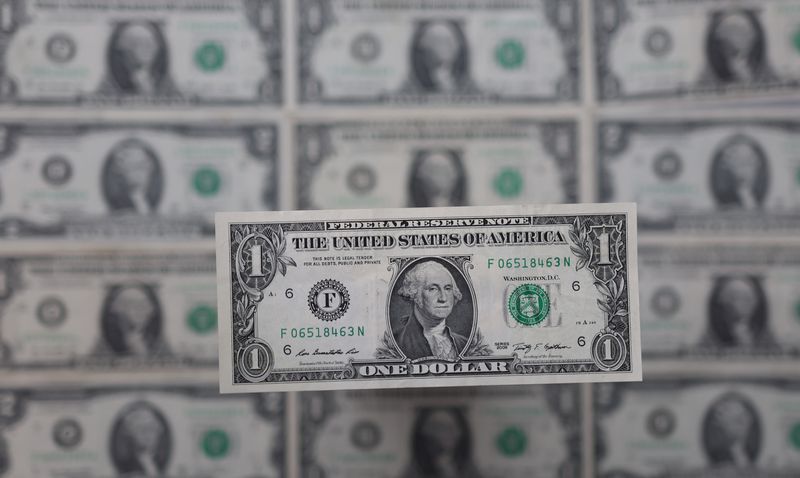NEW YORK (Reuters) – The dollar hit a 20-year high against a basket of currencies on Thursday as a sharp stocks selloff boosted demand for the safe-haven currency and as the Federal Reserve was seen as tightening monetary policy more than peers.
Stocks tumbled on Thursday as investors fretted the Fed might need to take more drastic action to bring inflation under control.
The greenback dropped on Wednesday, and stocks gained, after Fed Chair Jerome Powell told reporters that policymakers were not actively considering 75-basis-point moves in the future. It came after the U.S. central bank hiked rates by 50 basis points, as was widely expected.
“Markets cheered the Fed’s decision which came at the dollar’s expense as it helped to quell fears about aggressive rate hikes pushing the economy into recession,” Joe Manimbo, senior market analyst at Western Union Business Solutions said in a report.
“The dollar bounced back, though, as rates still appeared on a path to more than double (1.9%) by July and potentially triple (2.7%) by year-end, a solidly hawkish outlook that sets the Fed apart from its major rivals,” he added.
The dollar index reached 103.94, the highest since Dec. 2002, before falling back to 103.73, up 1.16% on the day.
Sterling fell to its lowest level since June 2020 after the Bank of England raised interest rates to their highest since 2009 but warned that the economy was at risk of recession.
“The Bank of England was extremely dovish,” said Erik Nelson, a macro strategist at Wells Fargo in New York. They are “basically telling the markets they are completely overpricing where the path of the bank rate is.”
The British currency was last down 2.25% at $1.2351.
The euro was also dented after German data showed that industrial orders in March suffered their biggest monthly drop since last October.
The single currency has fallen as the region struggles with weaker growth and energy disruptions due to sanctions imposed on Russia after its invasion of Ukraine.
It fell to $1.0518, down 0.98%, and is holding just above a five-year low of $1.0470 reached last Thursday.
Investors will be focused on U.S. inflation data for further clues on how aggressive the Fed will be in tightening policy.
This week’s major U.S. economic release will be the government’s jobs report for April released on Friday, while consumer price data is also due on Wednesday.
New claims for U.S. unemployment benefits increased to a more than two-month high last week, but remained at a level consistent with tightening labor market conditions and further wage gains that could keep inflation hot for a while, data on Thursday showed.
(Reporting by Karen Brettell; Editing by Andrea Ricci and Chizu Nomiyama)
























